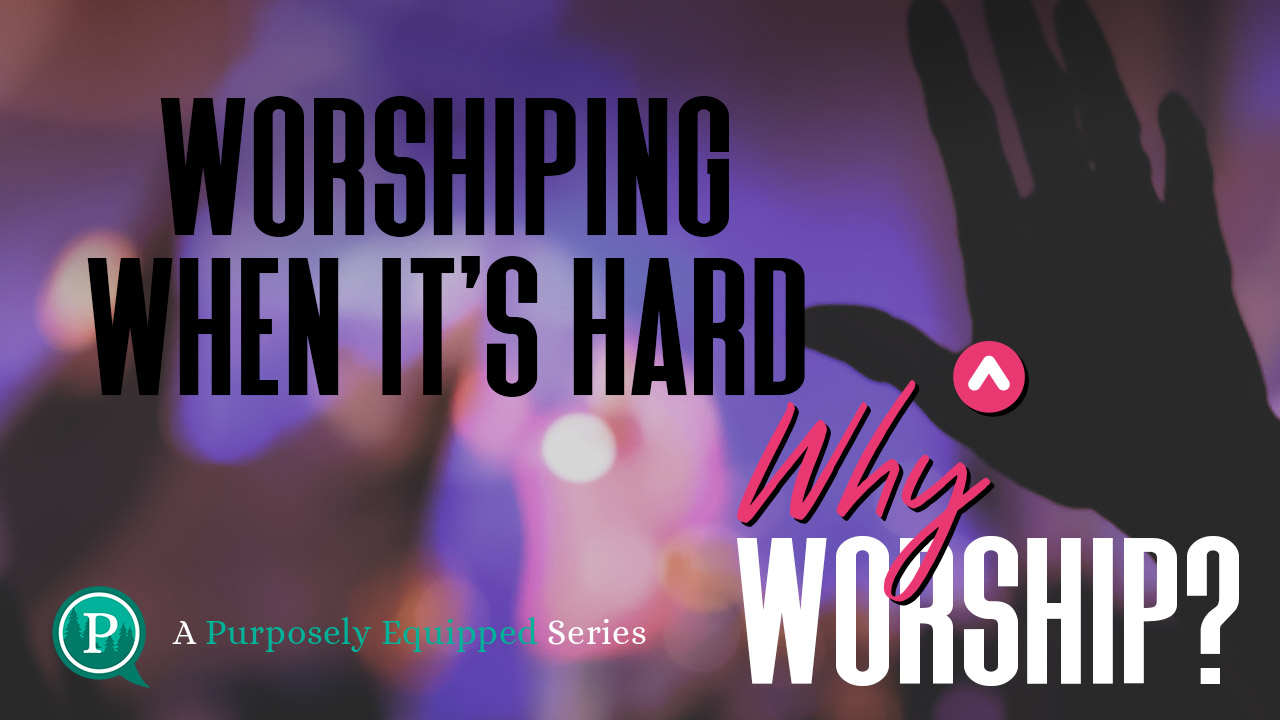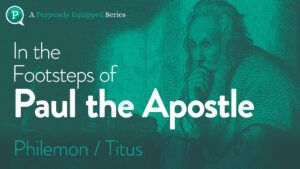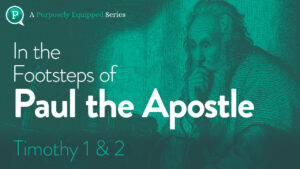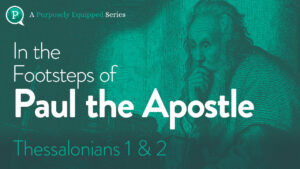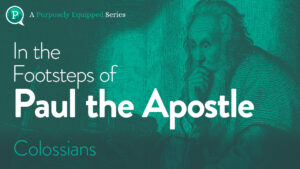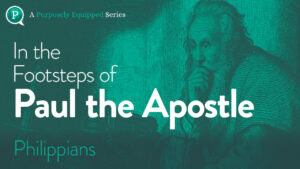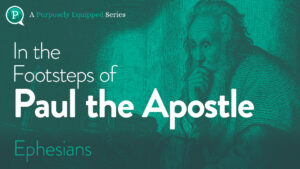Seasons of suffering and seasons of hardship are something that everybody experiences. Jesus said, “In this world, you will have tribulation.” So, there’s this expectation that either you have suffered, you are suffering, or you are going to suffer. The question becomes for the worshiper of Jesus then is what role does worship play when we’re suffering?
Canyon Hills Community Church digs deep into this today. We hope it blesses you in your past, or current suffering, or prepares you for suffering to come.
Show Notes:
Find Canyon Hills Worship: Online | Instagram | Facebook | Spotify | YouTube
Transcription:
Purposely; Your life, God’s Purpose. Listen at onpurposely.com.
Koby: But for anyone who is listening that is a worship leader, or even for those of you who maybe just need to change your perspective of what it is that you expect when you come to worship, worship is not just singing songs. Worship is offering hope. Yeah, right. I think it’s connecting those dots of exactly what you just said, Michael, which is reminding ourselves of what is true about the Lord.
Narrator: Welcome to Purposely Equipped. We want to help you go deeper in your faith by learning truth from the Bible. Our new series, Why Worship, will help us discover what the Bible has to say about the importance of worship in building a relationship with Jesus. Canyon Hills Worship will be joining us for this five-part series. No matter where you are on your journey, this is a topic that can greatly impact your walk with the Lord.
Koby: All right, welcome! This is Koby with Canyon Hills Worship. Michael with Canyon Hills Worship and Alicia with Canyon Hills Worship, which we had you in episode one, but this is the first time you making your return.
Michael: You’d think by now they would know that it’s Koby from Canyon Hills’ Worship.
Koby: Hey everyone, have I mentioned that It is Koby with Canyon Hills Worship. Today we are talking about worshiping when it’s hard. I made the mistake in the last podcast. We didn’t talk about what it is we were talking about until about six minutes in. So, starting off strong. Worshiping when it’s hard. Worshiping in seasons of suffering. Worshiping in seasons of hardship. Worshiping in seasons in which worship may not feel like the most natural of responses.
A season that everyone can identify with at some point in their life. But before we do that, we’ve been doing this with everyone. Alicia, Give us just a quick synopsis. Who are you, How did you get to here doing what you’re doing now? What are you doing now? And then your most embarrassing and or funny moment on stage.
Alicia: Okay, cool. Well, I’m Alicia Carter. I am one of the worship leaders here at Canyon Hills, and I oversee college worship, and I help with baptisms and I kind of do a little bit of a bunch of random things. I help with the vocals primarily too with our worship team. And how I got here was I went to the same college as you, Koby.
Koby: At the same time.
Alicia: Not at the same time.
Koby: We’re just as young as each other. It’s awesome.
Alicia: No, I’m a little bit younger, but we knew the same people there. I graduated. You needed a position filled here, and so our mutual friends, so kindly sent my information to you and that led to me moving from California to here about almost six years ago. I know, it’s wild. It’s, That is wild. And haven’t looked back. Never expected to be in Washington, but it has been so fun. Met my husband here. I feel very blessed.
Koby: And your first dog.
Alicia: And I just got a new dog. It’s like, life is good. But yeah, I’m thankful to be here and I feel like I have a lot of embarrassing moments on stage because I suck at talking. So, anytime I’m like doing a call to worship or a prayer time, I’m just like fumbling over my words. Regardless of how long I’ve talked about it or thought about it, I’m like struggling every single time.
Michael: Is there a specific one you can remember?
Alicia: Oh gosh. There’s…
Michael: Because I got like six in the back pocket.
Alicia: I know, I know you guys are just thinking of so many. I think I was encouraging people to like to respond and like, praise after a song. And I was like, clap. You know, just do that now.
Michael: And you were like, if you, if you believe it. Amen. Say that now,
Koby: She’s fragments of sentences being thrown out.
Michael: Maybe the most awkward thing I’ve seen.
Alicia: It was so bad that I like, could not contain my laughter. I laughed so hard from stage in that moment. I think we all did and yeah. I have, I feel like so many of those moments or in college I like started a song in the wrong key and had to like stop mid song.
Michael: Actually, I don’t think I can hit these notes.
Alicia: I cannot hit these notes. So, let’s start over. Yeah. Worship bleeding is super humbling.
Koby: My favorite moment, which very few people got to witness because it was just during a sound check and you, we were singing the song, The Solid Rock. My Hope is built on nothing less than Jesus, blood, and righteousness, and you got confused. I’m fairly confident you saying my hope is built in nothingness, which is pretty much the opposite of everything we stand for as a church.
Alicia: Yeah, I’ve, I’m also really bad at memorizing lyrics. So, the amount of times I have stumbled on lyrics, steering a song or saying the wrong thing.
Koby: It’s going sound like when people listen to this podcast that you’re completely un unqualified to do your Job.
Michael: For all the self-deprecating as she’s being, she is also an incredible worship leader. And is the voice you hear on a lot of the Canyon Hills worship songs.
Koby: Yeah. And while many of the things you’re saying may have been true seven years ago when you came, you are not the same worship leader today. You just give us a couple little gems here every once in a while, that we…
Alicia: I make em count, so yeah,
Koby: If you’re gonna mess it up. Mess it up. Boldly, confidently.
Michael: Well, you gonna do something to it big, you know?
Alicia: Yeah. I think it actually is an endearing thing when people mess up on from stage.
Koby: I really, I definitely, I’m telling myself what you think. Yeah.
Alicia: People love it. So.
Koby: All right. Well, today’s topic is probably the heaviest one out of all of the topics on worship that we’ve covered or are going to cover, because as I mentioned, Seasons of suffering and seasons of hardship are something that everybody experiences. Scripture promises, Jesus said, In this world, you will have tribulation. So, there’s this expectation that either you have suffered, you are suffering, or you, you are going to suffer. The question becomes for the worshiper of Jesus, when we keep using this term to be, be the obedient worshiper, what role does worship play when we’re suffering? So, there’s, I gotta better, I’ll throw that out. What do you guys got?
Michael: I mean, the role that worship has played just in my life through, in my experience in times of suffering, which seems to come pretty regularly, has just been reminding self and my heart of, of who God is. And also reminding myself that, that our God, like even through, through that suffering and through it, through all those like incredibly difficult times, is still with us. He’s still there and he still is comforting. He is a comforter. He is a healer. He’s a provider. He is all those things. All at once. And I think just reminding myself of that in those, in those hard times has come most of the time through music, cuz that’s like where I feel the Lord like speaks to me the most. And where I can like actually like process words strung together is like most easily through melody and, and I think like there’s just been some songs that have really blessed me over the years in that way.
Alicia: Yeah, I would agree. I feel like worship music has met me in a way unlike many other things in life, because like I’ve said before, like I’m not super great at speaking and it ha I have a hard time putting my emotion sometimes to words. But when I like, listen to a worship song and I’m like, Oh my gosh, that’s exactly what I needed to hear. That’s exactly like the encouragement I needed to hear. It’s the reminding of like my soul. This is the truth of who God is, and it just hits different than if like a good friend was to say those almost exact same things when it’s in a melody form of like, Oh yeah, that, that’s who God is. I’m in the trenches right now, but God’s so good. He’s still faithful, He’s still kind. And then even that act of singing those words in that moment, even if it’s just in the quietness of your house or your car or whatever that is, I don’t know, just changes your heart.
Koby: There is something about saying out loud or singing out loud and agreeing with true things, even if they don’t feel true in the moment. You know, like I, I think of the, the, one of the challenges in seasons of suffering and hurt, is that there’s a real temptation to believe the lie that your experience in that moment dictates who God is or what God does.
Right. Like in seasons of suffering, it’s easy to begin to doubt the goodness of God. Or the patience of God or the kindness of God. When, and I, when I say suffering, I’m not necessarily talking like, I mean, I’m ta I’m talking like children have passed away. Cancer diagnosis, loss of loved ones, loss of a job. I mean, I think of the season we just came out of with Covid where there’s a lot of people suffering the loss of many, many things. Worship is meant to offer a perspective shift and is meant to remind us of true things in the, in the face of what feels like a, like what, what lies feel true? Like I think of specifically a book of Lamentations, one of my favorite passages in all scripture, right? You’d get that, that great coffee cup first. But this I call to mine and therefore I have hope. The steadfast love of the Lord never ceases, right? What people miss is, it was located in the book titled Lamentations. And it was three chapters of Where are you, God? What are you doing? Why have you abandoned us? All of these things.
Michael: And then, but this I call to mind.
Koby: Right. It’s a, it’s a response. But this I call to mind in spite of all of these things. This I call the mind, and therefore I have. The steadfast love with the Lord never ceases. His mercies never come to an end. They are new every morning. Great is your faithfulness.
Michael: Yeah. And worship is so important in that calling to mind and what you do, worship leaders who are listening to this is very important on Sunday morning. For those people in the congregation, for yourself. If you’re in that season of calling to mind who our God is, cuz like that is the ultimate hope that you have. That’s the ultimate hope that you can provide or that you can reveal to people, Right? It’s like, it’s, it’s so important.
Koby: But let’s talk about that for a moment, because as this conversation evolves, worship is sometimes just viewed as a time of singing. Worship is sometimes just viewed as a particular set of songs strung together because they sound good together. They flow good together. Whatever. but for anyone who is listening that is a worship leader, or even for those of you who maybe just need to change your perspective of what it is that you expect when you come to worship… Worship is not just singing songs. Worship is offering hope. Right. I think it’s connecting those dots of exactly what you just said, Michael, which is reminding ourselves of what is true about the Lord. But then I think the responsibility of the worship leader, the responsibility of us in that worship time is to help people connect their hearts to that truth in a way that offers them hope. Understanding that if you’ve got a congregation of 10 or more people, there will be someone there who is having a great week and life’s never been better. And you will have people there who are at rock bottom and may not even be able to hardly get a sound out because of their suffering. Our job is to make sure that we’re facilitating an atmosphere of worship that offers hope to those people in that moment. But that hope’s gotta be anchored in who God is. Back to your point.
Michael: Yeah, exactly. I remember, I mean, this is a little bit off topic, but I remember like the first time I heard that song, Waymaker, that everyone has heard.
Koby: What song is that? Hum a couple bars for me.
Michael: Yeah. Yeah. That song I heard, I was on vacation with my wife, and I was doing my quiet time in the morning, and it was at a period of time when one of my family members was in his last couple weeks of life battling cancer and, and he said something at the, like, He Leland in that song is just, Saying some adlibs at the end. Your name is above so and so and so, and he said, Your name is Above cancer. And I was like, Whoa. Like even through this, this song, which was recorded live, you know, it was like it was a moment of worship elsewhere. Like that, that hit me so hard right there and like reminded me of like how, how great our God is. And even, even those, those worst of sicknesses, even those, those times that feel impossibly difficult, our God is still above that. His name is still above that. And like that, that moment is still so it’s seared in my memory of calling back to that. So yeah.
Alicia: Yeah, that’s good. As I was thinking about this topic, I was, I was reminded of Paul and Silas in the prison and how like worship changes things. Like I, I assume that every night they were worshiping and praying and they… I mean, as humans, I’m sure they felt hopeless in a lot of those moments. But they were consistent in that, through being in prison, and they kept doing it to the point where the foundation started to shake. The doors were opened, and then the, the prison guard came to know the Lord because of that moment. And I just thought, like so many things happen in worship, sometimes your circumstances change, sometimes they don’t. Sometimes your heart changes, and sometimes you’re singing to encourage the person next to you. It’s just like such a beautiful thing that the Lord allows us to be a part of that we don’t even really sometimes like, I think, grasp or understand of like, sometimes it’s we are maybe going, or we are in like the happiest place of our life, but our neighbors not. And we’re like singing to encourage those people. We’re worshiping to encourage those people. And sometimes we are in like the trenches and we’re worshiping in spite of that to be obedient, but also to refocus our mind and our thoughts back onto the creator of the universe. Off of our here and now and recognizing this isn’t our forever home. But I was just so encouraged by that of worship changes things.
Koby: There’s at least, there’s an entire message wrapped up in what you just shared. Like we could spend 40 minutes just on that. Because I think like what your point is so big in that one, they’re suffering in prison. I can’t remember if that’s the prison visit in which they were savagely beaten ahead of time. If, they probably were, whether it was mentioned or not. Prisons weren’t a great experience back then, but that probably wasn’t the first night that they’d worshiped. So, they’d already made the decision that even in the suffering they were gonna be worshiping. They’d probably worshiped and not been delivered, and yet they still continued to worship. And then how cool is it that when their deliverance came, it came while they were worshiping. Like, I hope that if I’m in a season of suffering and the Lord delivers me, I hope that he finds me worshiping when that happens. As we try and kind of wrap this up and land the plane, I guess my question for you guys would be, if there’s someone listening to podcast, who is in the season of suffering, and the reason why specifically one of the two of you involved in this particular topic is because I have been with as you have worshiped through seasons of suffering. How would you encourage the person who’s listening in their car, or listening on the computer, however you listen to his podcast, the person who’s sitting there going, I am in that season, and I do feel hopeless and I am hurting. What would you have me do?
Michael: Be honest.
Koby: How do you mean?
Michael: I think, share two points with us. But honestly share with the Lord how you’re feeling. And I just pulled this scripture up, Psalm 13. It’s a short one, so I’ll read the whole thing. How long Lord will you forget me? Forever. How long will you hide your face? How long must I take counsel in my own soul and have sorrow in my heart all the day? How long shall my enemy be exalted over me? Consider me and answer me, Oh Lord, my God. Light up my eyes lest I sleep the sleep of death. Lest my enemies say I prevailed over him. Lest my foes rejoice because I am shaken. But I have trusted in your steadfast love. My heart shall rejoice in your salvation. I will sing to the Lord because he has dealt bountifully with me.
This isn’t a time when David. Was being hunted by his son, Absalom. And his son, who he loved, wanted to kill him to take his throne. And then he’s also having to wrestle with the idea of killing his son. How long will you hide your face from me? He feels desperate in this moment, but then calls to mind that the Lord has dealt bountifully with him. The thing about that that is so encouraging to me is that he is not afraid to share what his situation feels like. He’s not afraid to share how much it hurts, and then reminds himself to worship through that. And I think that is honest worship. And I have had to wrestle with that a lot. Just a, I mean, I won’t get into it too much, but like just, there’s been a lot of death in my family and like, it feels like every, every year I expect, I expect it at this point. And it’s like that, that is such a, a frustrating thing, and that’s something that I’ve kind of had to wrestle with and talk through both with the Lord and people that I trust. And yeah, it’s, it’s interesting how, how worshiping through that has, has really, really shown me more of who our God is. Just how he has brought a peace to my heart through, through worshiping him that surpasses understanding. And I mean, I even think of, it as well, that song it as well, My soul sings. Not the hymn that you all know, not the hymn that you all know, but the Canyon Hills worship song that some of you might know. A couple, you know, that Alicia sang on. It Sounds great. That song I started, I was really, really mad. I was really mad at God when I started that song. And I’ve always been for as long as I can remember, at least all of my adult life has been like processing, has been always through the songwriting. Cuz it just, again, like stringing words together in a way that like has to be concise. Has to be like all those words matter. And that has been a good way for me to process my emotions. And with that song like, It started from this place of, of I’m, I’m angry. And I remember we were singing that song the original hymn it as well, I think in the process of writing that song, and yeah, there’s, there’s a lyric in there. It’s the you given takeaway. Your heart for me is good. And I was in a season of feeling a lot of taking away. And being reminded through, through scripture, through other songs, through words of encouragement from others, through prayer, that his heart for me is still good, even in those seasons of loss and taking away. So, yeah.
Alicia: A couple things come to mind. I would say if you’re listening to this, you’re probably a believer, and I would encourage those that are going through hard thing, hard things to like reach out to trusted friends that will encourage and to like, rally around. Cuz I know that when I’ve been really struggling, it’s super easy to isolate. And then you just kind of spiral down in your own little hole and it gets worse and you’re, it just everything’s affected at that point. But I’ve time after time, seen that if I just share it with like, my husband, Because he usually gets the brunt of it, of like, he’s like, Wait, what’s going on? And I’d like have a hard time processing. And then like eventually I’m like this. And he’s like, Oh, I wish I would’ve known that. Or like even at work where I’m like struggling and I like share with you Koby of like, this is, I’m struggling here at work because of this. And it’s like, oh, well now we can rally around you and encourage you and have grace. Like even I feel like we all have grace for each other, but even more so like, when we do feel or seem very foggy in like our tasks. So, that I think sometimes is easier said than done to just invite people into the messiness of life. But I also think, and this feels so opposite when you are hurting, is gratitude. Even like sometimes it feels like nothing is right, but like you woke up in that morning. Yeah. And he was like, Okay, Lord, thank you for waking me up. Or thank you for the gift of salvation. Like life really sucks right now, but like, thank you for saving me from eternity without you. Or like just thank you for sunshine. Or whatever that might look like. And it doesn’t have to be a long list, but I found in myself, It’s easy to hone in on all the negatives. And being grateful doesn’t change the negatives, but it does again, kind of the theme of this whole podcast, this episode has been the refocus of, refocusing of our mind. And I’m even reminded of you kind of hit on it, Mike, of the Philippians four, Rejoice in the Lord always. I will say again, rejoice. And the peace of God, which transcends all understanding won’t guard your heart and your mind in Christ Jesus. And I think that in those moments, it doesn’t make sense when we feel peace, but that’s just the Lord. And what else? Gratitude. Community.
Koby: I think that’s, I think, honestly, I think that’s a good place to kind of land this plane. I think kind of steering it back towards the corporate worship piece. The value of worshiping corporately in seasons of suffering is it gives us an opportunity to participate in the truth that our heart needs to be calling to mind. This I call to mind, and therefore I have hope. When we worship together corporately, we’re able to call those things together. And we even talked about this a little bit in one of the last podcasts of, it also gives the Lord the opportunity to minister to you through the voices of other people. As you come together, if you’re suffering, you don’t even have the strength to sing, where better to go than the house of the Lord and let other people sing true things over you and allow your heart and your soul to be ministered to in that way. It’s just such a, he said one of the last podcasts, you know, our, our, our vision statement as a ministry, creating atmospheres of worship that are Jesus focused and eternity minded. Allowing that space, even in the midst of our suffering to go, this is not all about me. It is still all about Jesus. And the sufferings of this present time pale in comparison to the glory that is to come. That we set our fix, our hearts and our minds on eternity.
So, we’re gonna stop there. Thanks, guys, for being willing to sit down and talk through this. Next week, we’re gonna, Be looking at worship as a lifestyle, and so hopefully today, minister to any of you listening and hopefully next week will as well see you.
Narrator: Again, special thanks to our hosts for this series, Canyon Hills Worship. Don’t forget to check out their music on Spotify or Apple Music, or anywhere you listen to music digitally. Thank you for downloading Why Worship; a Purposely Equipped series. Let’s keep growing in our faith together. Purposely Equipped is part of Purposely a podcast network with practical podcasts, to help you find and live in God’s purpose for your life. Find more podcasts and faith resources at onpurposely.com.
Follow this podcast:

